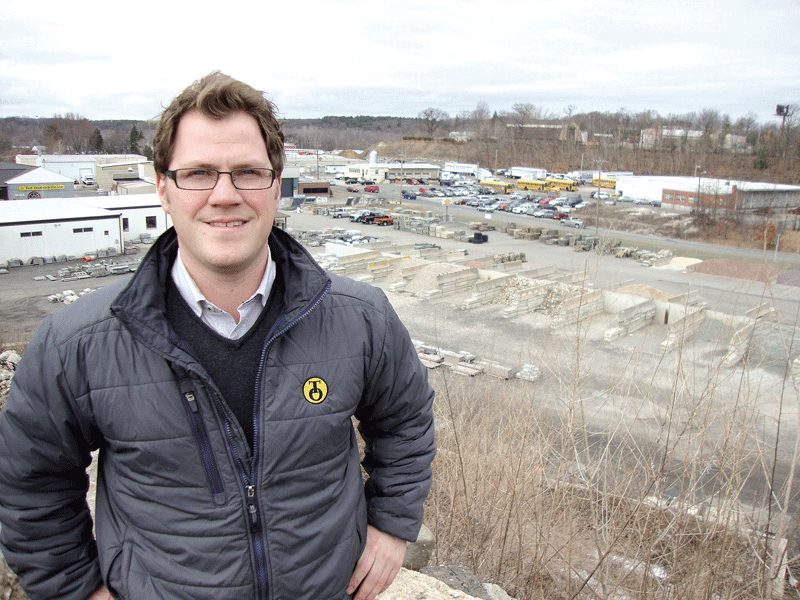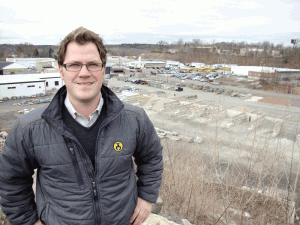
Material World
The Ondrick Group Takes It ONE Step at a Time

Adam Ondrick says it’s important in the construction industry to figure out where the market is moving next.
If you’ve been in the construction business for almost 75 years, chances are you’ve made some good decisions along the way.
Adam Ondrick is the latest generation to lead the company that bears his grandfather’s name, the Ted Ondrick Co., and he said that one way to move forward in this industry is by figuring out where the market is heading next.
Ted Ondrick started the firm back in 1937, when the operation consisted of a tractor to create gardens and a horse and scoop loader to dig foundations. Mechanization was the next step, and with more machinery meant more jobs — Adam said that his father, Tadj, joined Ted in the business around this time, and the pair was taking on more utility work.
“When my dad entered the business,” he continued, “they were building sewer systems — larger infrastructure-type projects. But it was my father who started the company in the materials and environmental side of the business.”
He said this while driving around the extensive Ondrick yards off Fuller Road in Chicopee, and from this vantage point, it’s easy to see how construction material is still the biggest facet to this family operation. With a large asphalt-manufacturing plant and environmentally-sound remediation for contaminated construction and landscape debris, the Ondrick Group is one of the area’s leaders for building materials.
But, like the generations before him that saw the necessity of keeping ahead in the industry by broadening the scope of the business and adding diversity, Ondrick is focused on the future as well as the present. And he told BusinessWest how the newest component to what may soon be called Ondrick Materials Group is all about the next big thing.
The latest business venture is called Ondrick Natural Earth (ONE), and when the family members opened the doors to this showroom and material yard across the street from the larger offices almost five years ago, they knew that the time had come to do more business by expanding both what they sell, and to whom they sell it.
He called this a “vertical integration” of construction materials, “so that we can provide material to any type of project, and fit the needs of any type of client.
“Before we opened up ONE, we were serving larger customers,” he continued, “and we had to turn away a lot people, homeowners, masons, small contractors, and landscapers. We didn’t have the venue to facilitate working with them. Now we do.”
Rock and Roll
“In my grandfather’s time, we were primarily focused on construction; he really built the business on that,” Ondrick said. “My father ushered in the era of materials and construction.”
In that time, he elaborated, the business didn’t become the largest construction or commercial-materials firm, but large enough to handle some pretty big jobs.
“Rock crushing at Gillette Stadium, runways at Westover, that’s just some of things we’ve been involved in,” he explained. “Over the years, my dad did runways for about eight different airports. We have been doing roadways across New England for decades.”
But, he continued, the business has changed over time.
“Over the years, we had to evaluate what our company was made of,” he explained. “We realized that there’s a lot of competition out there in the construction business. Not that we don’t have a lot of competition for the materials business, but not everyone has the facility and permits to operate, or manufacture asphalt, or to recycle contaminated soil, buildings, and property to facilitate the manufacture of materials.”
The primary components of the Ondrick business are still asphalt and material construction, and material remediation. These operations dominate the back landscape at the yards in Chicopee.
But Ondrick explained how his grandfather’s approach gives the business a competitive advantage, using proprietary methods in material production.
“We crush concrete and asphalt and make hard pack, which is then used in roadway construction,” is how he explained one process. “We’re recycling construction debris and reusing it instead of using product from a quarry. It’s very popular in urban areas, not so much in rural areas, but in urban situations where there aren’t as many landfills, and hauling debris is more of a necessity.
“And with the remediation of the petroleum-impacted soil,” he continued, “we put the soil through a proprietary process where we encapsulate the hydrocarbons and make a reusable, non-leaching product. My father was at the forefront of that industry back in the 1980s. It has stood the test of time, that business. It still goes strong today.”
Material Witness
When the company officially celebrates its 75th anniversary in 2012, Adam Ondrick said one of his big plans as president of the company will be in name only.
“Probably at that time I’m going to rebrand,” he said, “perhaps to the Ondrick Materials Group, to show the different extensions and the scope of the business.”
That newest addition to the Ondrick portfolio, ONE, officially started five years ago, but Adam said the venture was a few years on the drawing board.
“In driving around New England, we had a lot of exposure to different companies that had diversified their holdings,” he explained. “But we noticed, in our area, a lack of a true landscape-product supply yard. There were many older models of how to do business in that field, where people would take a masonry yard and adapt it, or a nursery, greenhouse type environment would have a small selection of hard goods. We noticed in the Boston and Connecticut markets that yards were popping up where all they sold were hardscape materials — stone, concrete pavers, concrete retaining-wall block.”
The property across the street from the company’s headquarters was coming on the market, and the Ondricks knew that the time had come for that business model they had seen elsewhere to come a little closer to home.
Fast-forwarding to the opening of the Ondrick Natural Earth showroom and sales yard, with materials ranging from bluestone to mulch to engineered concrete-building materials, the company president said that everything they had always wanted to offer their customer base was finally all on one property contiguous to the Ted Ondrick facility. Everything was falling into place … except the economy.
“I had a lot of people coming up to me saying, ‘you picked the worst time to be getting into business,’” Ondrick joked.
“At first I was kind of discouraged about that,” he continued, “but, really, it had taken us three years to get that division of the company on its feet. It took a long time in permitting, in negotiating the property purchase, getting it renovated. Getting into business when we did, it made us take a look at everything we did and really analyze it, because we couldn’t afford to make a mistake.”
ONE is a reinvention of the original firm’s founding, he said, and in keeping with the generations before him who helped the company evolve to what it has become, this new venture keeps the Ondrick legacy relevant, and ahead of current market trends.
The backyard do-it-yourself ethos has gained ground in the tough economy, and Ondrick said that reaching out to that demographic, as well as to smaller contractors, is a way to keep building the business.
“And we’ve been able to grow about 25% every year even through the down economy,” he said.
Prior to ONE, the Ondrick name was most likely seen on large commercial or state construction projects. “But we’ve fashioned our business model at ONE to attract homeowners into our store. There, they can learn about the product we’re selling and get educated by our staff with information on the products that we offer.”
At the beginning, he thought that natural stone materials — granite, bluestone, Goshen stone — would be the bulk of what people would want to use. “We were totally wrong about that,” he said, smiling. The wave of the future for homeowners, he explained, is in concrete-based products.
“People think of a concrete patio,” he said, “and the old model was a poured slab that over time cracks and heaves. With the new paver technology, you can install a patio that will last a lifetime. And if you need it to be free draining, there are permeable pavers where the water drains right through to an underground area. You avoid runoff on your property and have lifelong longevity.”
These materials aren’t just relegated to the DIY crowd, either.
“The DEP and EPA put increasing stormwater mandates into developing,” Ondrick explained, “and developers are looking for ways to control that storm water on their properties. The new generation of concrete pavers will help them with that problem.”
While the initial cost may be higher at this time, he said that the future of infrastructure construction will need to meet those tighter guidelines, and the products are going to address those constraints.
EZ Street cold asphalt is another product that he sees revolutionizing the industry, and the company is the local manufacturer and distributor, an introduction to the Ondrick portfolio made by his vice president and brother, Todd. “The process that we use to make EZ Street is contained in a safe environment,” he said. The product is also bagged for smaller applications, and the demand for this material has had the business sending it as far afield as JFK Airport, and even Ireland.
Unlike traditional hot-asphalt installation, or cold patch, “with EZ Street there’s never any diesel that comes in contact with the ground. There’s also a hybrid mix that we make which utilizes some recycled materials. Cities and towns that are looking for a green product, we have it.”
And that’s the message he wants the region to know — when it comes to hardscape products of all types, ONE will have it.
Paving the Way
Where the generations before him saw new ways to expand in construction, the latest Ondrick to head the family business says that ONE is the latest means to stay on top of the industry. “We definitely see a lot of growth with ONE,” he said. “There is potential out there that we haven’t captured yet.
“We don’t look at ONE as opening a new business,” he continued. “It’s more a continuation of what we already do.”
With his father still clocking in every day, the latest generation looks to the future grounded in the strength of its past. “My dad is still very active here, for which we are all thankful. He has so many years of industry experience, having ridden the ups and downs over the years — he’s a great resource to have.”
And, like any project that promises good results, Ondrick knows how important it is to have the best materials to work with.




